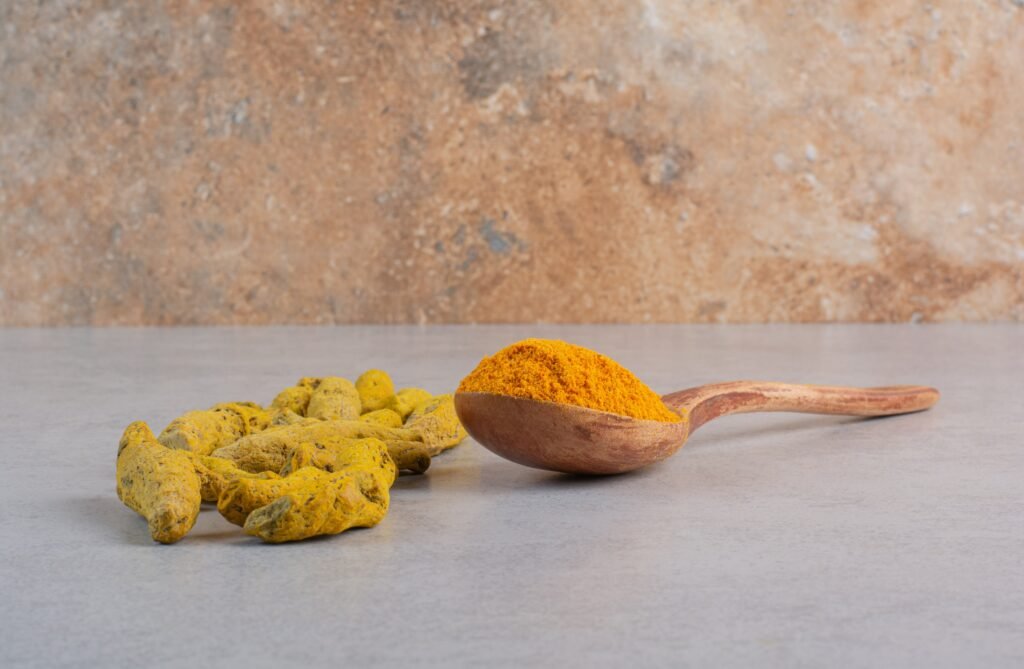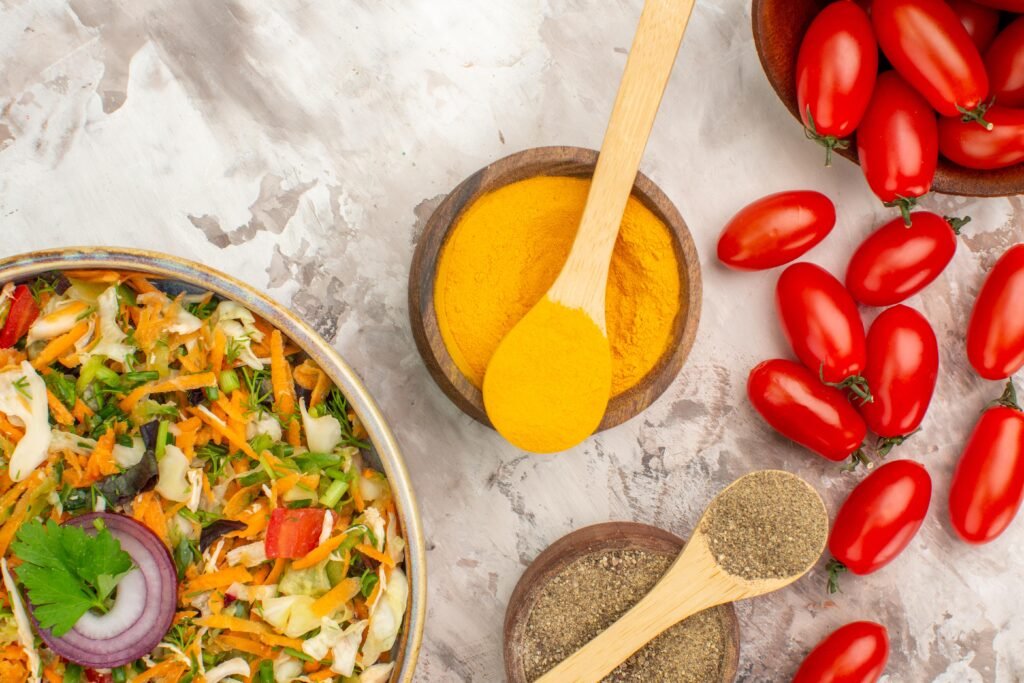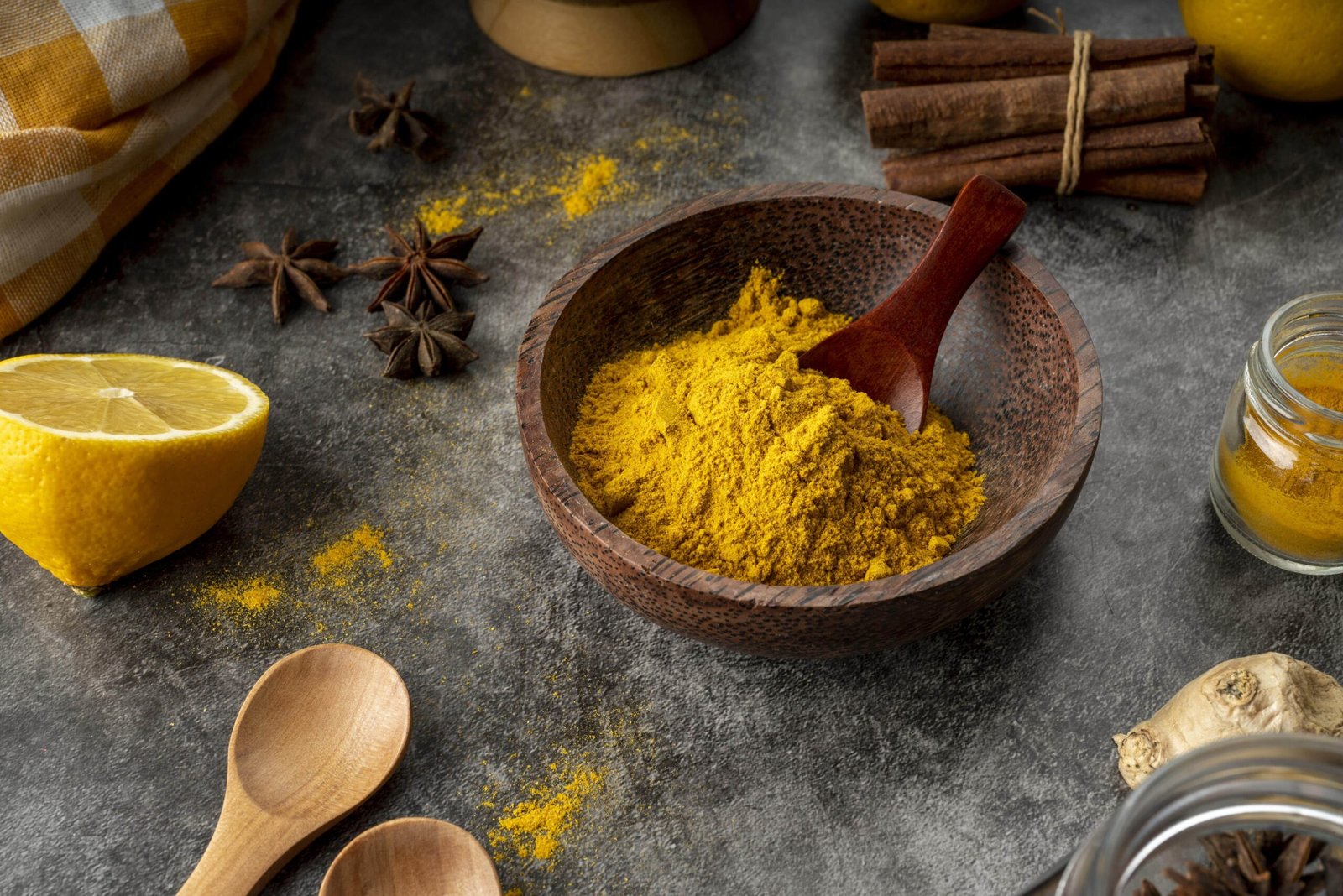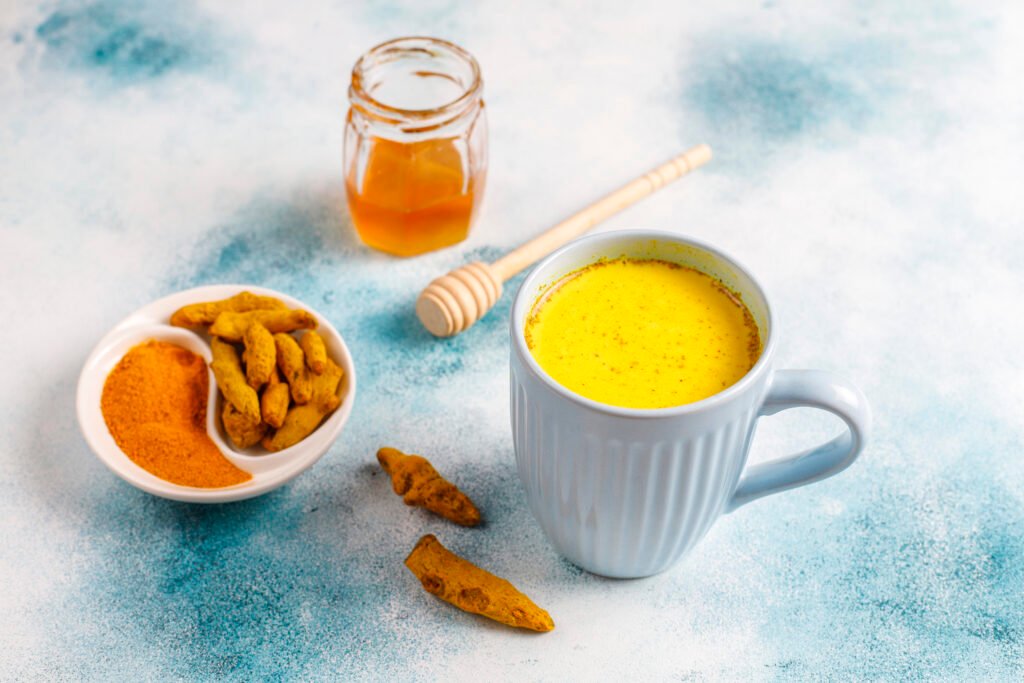Why Turmeric Deserves Your Attention
When it comes to gut health, one golden spice has been making waves across kitchens and research labs alike: turmeric. This vibrant yellow root, often celebrated in Ayurveda and traditional Asian cuisines, has found its way into modern wellness routines, supplements, and scientific studies.
But beyond its culinary allure, turmeric (and its active compound, curcumin) has a powerful effect on inflammation—a critical factor in gut health and overall well-being. If you’ve ever wondered how turmeric influences digestion, the microbiome, and even conditions like IBS, leaky gut, or gastritis, this guide will walk you through the science and the lived experiences of turmeric and gut health.
Table of Contents
The Science of Turmeric and Curcumin

What Is Turmeric?
Turmeric (Curcuma longa) is a root belonging to the ginger family. It’s been used for over 4,000 years in India and Southeast Asia for cooking, healing, and rituals.
The main bioactive compound in turmeric is curcumin, a natural polyphenol responsible for most of turmeric’s medicinal properties. Curcumin is both an antioxidant and an anti-inflammatory agent.
The Problem of Inflammation in the Gut
Chronic gut inflammation is often at the root of digestive discomfort and disease. Common issues linked to gut inflammation include:
- IBD (Inflammatory Bowel Disease)
- Irritable Bowel Syndrome (IBS)
- Leaky Gut Syndrome
- Gastritis and Ulcers
When unchecked, inflammation damages the delicate gut lining, disturbs the microbiome, and makes digestion painful.
How Curcumin Works in the Body
Curcumin suppresses several molecules that play a role in inflammation, such as NF-kB and cytokines. Research shows that turmeric:
- Reduces oxidative stress
- Improves the gut microbiome balance
- Strengthens intestinal barrier function
- Calms overactive immune responses
This explains why turmeric has gained attention not only as a spice but also as a functional food and supplement.
Turmeric and Gut Microbiome
Your gut microbiome is a bustling ecosystem of trillions of bacteria, fungi, and other microbes. These tiny organisms play a vital role in digestion, immunity, and even mood regulation.
Recent studies suggest turmeric positively influences microbiome composition by:
- Encouraging growth of beneficial bacteria like Bifidobacteria and Lactobacillus
- Reducing harmful bacteria linked to inflammation
- Producing metabolites that further lower gut irritation
In essence, turmeric acts like a gardener, helping the good microbes flourish while keeping harmful ones in check.
Anti-Inflammatory Benefits
Turmeric for IBS
Irritable Bowel Syndrome affects millions worldwide, with symptoms ranging from bloating to cramping. Clinical trials show that turmeric supplements can reduce abdominal pain and regulate bowel movement frequency.
Turmeric for IBD
For conditions like Crohn’s disease and ulcerative colitis, studies reveal curcumin supplementation decreases disease activity and promotes remission when used alongside conventional therapy.
Turmeric for Leaky Gut
Turmeric strengthens tight junctions in the gut lining, preventing harmful substances from leaking into the bloodstream—a process linked to systemic inflammation and autoimmunity.
Gastritis and Acid Reflux
Turmeric has shown potential in reducing stomach lining irritation and regulating acid secretion, making it a natural aid for those dealing with gastritis or chronic heartburn.
Chapter 4: Practical Ways to Use Turmeric for Gut Health
Turmeric is only effective for your gut if you actually consume it consistently and in forms your body can absorb. The good news is, whether you’re a foodie, a smoothie lover, or someone who prefers simple supplements, there are plenty of practical ways to add turmeric into your daily routine.
Below, we’ll break down the most effective ways to use turmeric for digestion and gut health.
Using Turmeric in Everyday Cooking

Turmeric is one of the easiest spices to slip into your meals. It has a warm, earthy flavor with slightly bitter undertones that pairs beautifully with both savory and sweet dishes.
Ideas for Gut-Friendly Meals with Turmeric
- Golden Rice – Add ½ teaspoon of turmeric while cooking rice. Not only does it give your dish a golden hue, but it also makes a great base for curries or stir-fries.
- Turmeric Scrambled Eggs – Sprinkle turmeric into scrambled eggs or tofu scramble for an anti-inflammatory breakfast.
- Turmeric Roasted Vegetables – Toss carrots, cauliflower, or sweet potatoes with turmeric, olive oil, and black pepper before roasting.
- Bone Broth with Turmeric – Bone broth already supports gut lining repair. Adding turmeric amplifies its healing properties.
Pro tip: Always add a pinch of black pepper when cooking with turmeric. Piperine in pepper enhances curcumin absorption by up to 2000%.
Healing Drinks with Turmeric
Turmeric isn’t limited to food—it shines in beverages too. Drinks are one of the most soothing and practical ways to deliver turmeric’s benefits directly to your gut.
Popular Gut-Healing Drinks with Turmeric
- Golden Milk (Turmeric Latte): A blend of turmeric, warm milk (dairy or plant-based), black pepper, and sometimes ginger or cinnamon. Best taken before bed to calm digestion.
- Turmeric Tea: Simmer turmeric root slices (or powder) with ginger in hot water, strain, and sip. Add honey for sweetness.
- Morning Detox Shot: Mix turmeric powder with lemon juice, ginger, and warm water. It’s a powerful way to kickstart digestion.
- Smoothies with Turmeric: Blend bananas, pineapple, spinach, ginger, and turmeric for a refreshing gut-friendly smoothie.
Fresh vs. Powdered Turmeric
Both fresh and powdered turmeric can help your gut, but they have slightly different uses.
- Fresh Turmeric Root: More potent in essential oils; ideal for juices, teas, and cooking. Grate it just like ginger.
- Powdered Turmeric: Convenient, shelf-stable, and versatile for curries, soups, and smoothies.
If possible, rotate between both forms to maximize benefits.
Turmeric Supplements for Gut Health
While food-based turmeric is excellent, the therapeutic dose required for gut inflammation is often higher than what you’d normally eat in meals. This is where supplements come in.
What to Look for in a Supplement

- Standardized Extracts – Ensure it lists curcumin content (ideally 95% curcuminoids).
- Enhanced Absorption Formulas – Look for turmeric combined with piperine or formulated as liposomal curcumin, phytosome curcumin (Meriva®), or micelle curcumin for maximum bioavailability.
- Dosage – A typical effective range is 500mg – 2000mg/day, divided into 2–3 doses.
Who Should Consider Supplements?
- People with IBS, IBD, gastritis, or leaky gut
- Those with chronic bloating, inflammation, or indigestion
- Anyone who struggles to include turmeric regularly in meals
Combining Turmeric with Other Gut-Healing Foods
For a synergistic effect, pair turmeric with other gut-friendly superfoods:
- Ginger – Enhances digestion and reduces nausea
- Bone Broth – Repairs gut lining
- Probiotic Foods (yogurt, kimchi, kefir) – Restore microbiome balance
- Healthy Fats (coconut oil, olive oil, ghee) – Improve curcumin absorption
- Fiber-Rich Foods (chia seeds, oats, legumes) – Nourish beneficial gut bacteria
When and How to Take Turmeric for Best Results
- With Food: Curcumin is fat-soluble, meaning it absorbs better with healthy fats like avocado, olive oil, or coconut oil.
- Timing: Many people prefer turmeric in the morning (detox shot) or evening (golden milk) for maximum gut-calming benefits.
- Consistency: Benefits are gradual. Aim for daily use for at least 4–8 weeks.
Safety Considerations
Turmeric is generally safe, but too much can cause mild digestive issues like nausea or diarrhea. Keep in mind:
- Avoid high doses if you have gallstones or bile duct obstruction.
- People on blood thinners should consult a doctor before supplementation.
- Pregnant or breastfeeding women should use food-based turmeric and avoid high-dose supplements unless medically approved.
A Sample Daily Gut-Healing Routine with Turmeric
Here’s how you could naturally work turmeric into your day:
- Morning: Warm lemon-turmeric detox shot
- Lunch: Turmeric spiced quinoa salad with chickpeas
- Afternoon Snack: Green smoothie with turmeric and ginger
- Dinner: Curry or soup with turmeric and black pepper
- Evening: Golden milk before bed
By spreading it throughout the day, you keep a steady supply of curcumin working on gut inflammation and microbiome support.
Personal Touch – My Journey with Turmeric
A few years ago, I struggled with chronic bloating and stomach discomfort. After countless probiotic experiments and diet adjustments, I stumbled upon turmeric tea. At first, it felt like just another wellness fad.
But after consistently sipping golden milk at night, I noticed real changes:
- Reduced bloating after meals
- More energy in the mornings
- Less reliance on antacids
Later, when I introduced a curcumin supplement, the benefits deepened. While it wasn’t a magic cure, it became a reliable tool in my gut health toolkit—a reminder that sometimes ancient wisdom aligns perfectly with modern science.
Conclusion: The Golden Path to Gut Healing
Turmeric is more than just a spice—it’s a scientifically backed, gut-loving, anti-inflammatory powerhouse. From calming IBS symptoms to strengthening your gut lining, this golden root has proven itself both in the lab and in personal experiences.
In a world where digestive issues are on the rise, adding turmeric to your daily wellness routine could be one of the simplest yet most powerful steps you take toward a healthier, calmer gut.
Frequently Asked Questions
1. Does turmeric really help with gut inflammation?
Yes. Turmeric contains curcumin, a compound shown in studies to lower inflammation markers in the digestive system. It reduces bloating, supports the gut lining, and promotes a healthier microbiome balance.
2. How much turmeric should I take daily for gut health?
For general wellness, ½–1 teaspoon of turmeric powder in food is a good start. For therapeutic benefits, many experts recommend 500–2000 mg of standardized curcumin supplements daily, taken with black pepper and healthy fats for better absorption.
3. How long does it take for turmeric to work for digestion?
Results vary, but most people notice improvements in 4–8 weeks of consistent use. Regular daily intake is key to seeing reduced bloating, better digestion, and less gut discomfort.
4. Is turmeric good for bloating and gas?
Yes. Turmeric helps calm the digestive tract, reduce spasms, and improve bile production, which aids fat digestion. This can ease bloating, trapped gas, and indigestion naturally.
5. Can turmeric help with IBS or IBD?
Studies suggest turmeric can reduce abdominal pain and regulate bowel movements in IBS patients. For IBD conditions like Crohn’s disease and ulcerative colitis, curcumin supplements may help lower inflammation when used alongside prescribed treatments.
6. Is turmeric safe to take daily?
Turmeric in food is safe for daily use. However, if you’re taking high-dose supplements, consult your doctor—especially if you’re pregnant, breastfeeding, on blood thinners, or have gallbladder issues.
7. What’s the best way to consume turmeric for gut health?
The most effective ways include:
- Golden milk (turmeric latte)
- Turmeric tea or detox shots
- Curries, soups, and smoothies
- Standardized curcumin supplements with black pepper or enhanced absorption formulas
8. Can turmeric heal leaky gut?
Turmeric helps strengthen the intestinal barrier, reducing permeability (leakiness). While not a cure-all, it supports healing when combined with a gut-friendly diet, probiotics, and lifestyle changes.
9. Should turmeric be taken on an empty stomach or with food?
It’s best to take turmeric with meals containing healthy fats (like avocado, coconut oil, or olive oil). This boosts absorption and reduces the chance of stomach upset.
10. Fresh turmeric vs. turmeric supplements – which is better?
- Fresh/powdered turmeric is great for daily use and prevention.
- Curcumin supplements are better for those dealing with chronic gut inflammation, IBS, or IBD, since they deliver higher therapeutic doses.

